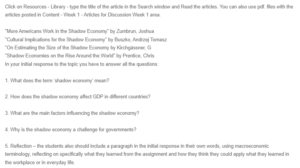GDP and Shadow Economy
A shadow economy refers to economic transactions that are deemed illegal. One of the reasons that render such activities illegal is the failure to comply with government requirements on reporting. Besides, the nature of the said goods and services may be illegal organically. In the US, for instance, the shadow economy comprises activities like street drug selling and prostitution (Zumbrun, 2013). It is difficult to gauge the size of such activities because no government reporting occurs to determine their extent.
Impact of Shadow Economy on GDP
An immediate impact of a high shadow economy is that it depresses GDP (Buszko, 2018). A higher shadow economy means the country collects less in terms of taxes. On the other hand, a shrinking shadow economy stimulates GDP growth since revenue agencies can collect more revenue. In turn, governments use the collected revenue to engage in infrastructural development, a factor that stimulates economic growth.
Factors Influencing the Shadow Economy
One of the primary factors influencing the shadow economy is the tax burden. If people feel the government is frustrating them with a high tax, there is an incentive to resort to a shadow economy since there is zero tax (Elgin, 2019).
Another notable factor influencing the shadow economy is the ineffective social welfare system. If one loses a right to a social welfare program in some countries, they must undergo a strict verification process before qualifying. Such bureaucracy makes people resort to working in a shadow economy to avoid potential future restrictions.
The Challenge of Shadow Economy for Governments
Shadow economies pose serious challenges to all countries worldwide, particularly developing countries. Most or all transactions within the shadow economy are untaxed, thereby presenting fiscal challenges to governments. Also, state power is likely to be impacted negatively if people feel they can undertake economic activities without the government’s interference (Kirchgässner, 2017).
Conclusion
In a nutshell, shadow economies hurt the fiscal position of governments, especially in the developing world. However, I believe a shadow economy is necessary for people’s survival. Were it not for activities like prostitution, sex workers and those who depend on them for livelihood would go to bed hungry.
References
Buszko, A. T. (2018). Cultural Implications for the Shadow Economy. Engineering Economics, 29(1). https://doi.org/10.5755/j01.ee.29.1.18069
Elgin, C. (2019). Shadow Economies Around the World: Evidence from Metropolitan Areas. Eastern Economic Journal. https://doi.org/10.1057/s41302-019-00161-4
Kirchgässner, G. (2017). On Estimating the Size of the Shadow Economy. German Economic Review, 18(1), 99–111. https://doi.org/10.1111/geer.12094
Zumbrun, J. (2013, March 28). More Americans Work in the Underground Economy. Bloomberg.
ORDER A PLAGIARISM-FREE PAPER HERE
We’ll write everything from scratch
Question

GDP and Shadow Economy
Click on Resources – Library – type the title of the article in the Search window and Read the articles. You can also use pdf. files with the articles posted in Content – Week 1 – Articles for Discussion Week 1 area.
“More Americans Work in the Shadow Economy” by Zumbrun, Joshua
“Cultural Implications for the Shadow Economy” by Buszko, Andrzej Tomasz
“On Estimating the Size of the Shadow Economy by Kirchgässner, G
“Shadow Economies on the Rise Around the World” by Prentice, Chris
In your initial response to the topic you have to answer all the questions:
1. What does the term ‘shadow economy’ mean?
2. How does the shadow economy affect GDP in different countries?
3. What are the main factors influencing the shadow economy?
4. Why is the shadow economy a challenge for governments?
5. Reflection – the students also should include a paragraph in the initial response in their own words, using macroeconomic terminology, reflecting on specifically what they learned from the assignment and how they think they could apply what they learned in the workplace or in everyday life.

